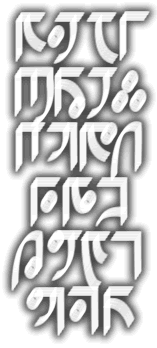|
The World of Teréth End - Supplements |
||||||
|
"A song in your heart Inscribed on steps of Paldan Conservatory |
Book of Language - Murdwürmor
In the current Age, the primary language of the Dwürden is Murdwürmor. Contemporary usage of this language is reserved almost exclusively to its written form. It is generally spoken only in the company of non-native speakers and scholars of the race. Conversational Murdwürmor has been splintered by racial division (e.g. Dwürnmor, Falwurd, Flogwürn, Narwurd and Skwürn) and regional dialects. To the trained ear of non-native speakers the differences between sub-race dialects is sometimes apparent (i.e. Flogwürn) but the difference in regional dialects remain elusive. Despite these variations, the Murdwürmor script (Murdwürgarwurd) has remained mostly intact for many centuries. Among other idiosyncracies of Murdwürmor, are the absence of "ch" and "sh" sounds. Dwürden are not incapable of making the sounds; they simply do incorporate them into their language(s). Flogwürn comes the closest with abundant "-ik" and "-isk" sounds. Exceptions to these rules may be found in proper names (see Yzelesk). Murdwürmor Grammar Murdwürmor Script The characters of Murdwürgarwurd are drawn with straight lines in a fashion that would be easy to carve from stone using even basic tools. The alphabet is a simple one, using only 21 characters (A, B, D, E, F, G, H, J, K, L, M, N, O, R, S, T, U, W, Y). No two characters share purpose with any other letter (such as the english "c" and "k"). Recent scripting has adopted spaces between words (as used in most Uren scripts and all Elve scripts). Traditional writing uses the 22nd character "arkom", meaning "no letter". Transliterization ln Murdwürgarwurd, vowels are sometimes interchangeable.
It is common during transliterization to avoid the use of
certain letters; "i" for instance, is commonly
substituted by the letter "y" while "f"
serves the function of "v" (opposite of Dekàlan).
Functionally there is no difference. The practice reflects
the Dwürden use of a twenty-one character alphabet.
Murdwürmor to English Dictionary A E D F G H J K M N T U Y a (date), ah (sad), ay (hand), e (heed), eh (ten), ooh (moo), u (unite), uh (bull), k (can), v (fvoul)
|
Supplements Art Languages The following abbreviations are used throughout the Othlopædia: Acen. (Acentran) |
||||
|
Ref. PHB (Player's Handbook), © Wizards of the Coast  |
||||||
